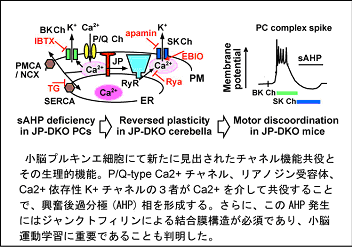 |
新着情報 |
小脳可塑性と運動学習におけるジャンクトフィリンの機能 (2007. 2)
Junctophilin-mediated
channel crosstalk essential for cerebellar synaptic plasticity
Kakizawa, S., Kishimoto, Y., Hashimoto, K., Miyazaki, T.,
Furutani, K., Shimizu, H., Fukaya, M., Nishi, M., Sakagami,
H., Ikeda, A., Kondo, H., Kano, M., Watanabe, M., Iino, M.&
Takeshima, H. (EMBO J. 26, 1924-1933, 2007)
|
| Functional crosstalk
between cell-surface and intracellular ion channels plays
important roles in excitable cells and is structurally supported
by junctophilins (JPs) in muscle cells. Here we report a novel
form of channel crosstalk in cerebellar Purkinje cells (PCs).
The generation of slow afterhyperpolarization (sAHP) following
complex spikes in PCs required ryanodine receptor (RyR)-mediated
Ca2+-induced Ca2+ release and the subsequent opening of small-conductance
Ca2+-activated K+ (SK) channels in somatodendritic regions.
Despite the normal expression levels of these channels, sAHP
was abolished in PCs from mutant mice lacking neural JP subtypes
(JP-DKO), and this defect was restored by exogenously expressing
JPs or enhancing SK channel activation. The stimulation paradigm
for inducing long-term depression at parallel fiber-PC synapses
adversely established long-term potentiation in the JP-DKO
cerebellum due primarily to the sAHP deficiency. Furthermore,
JP-DKO mice exhibited impairments of motor coordination and
learning, although normal cerebellar histology was retained.
Therefore, JPs support the Ca2+-mediated communication between
voltage-gated Ca2+ channels, RyRs and SK channels, which modulates
the excitability of PCs and is fundamental to cerebellar long-term
depression and motor functions. |
 |
|